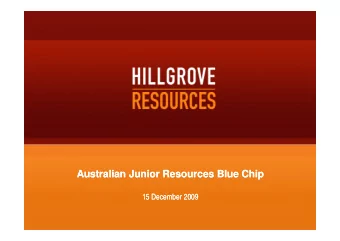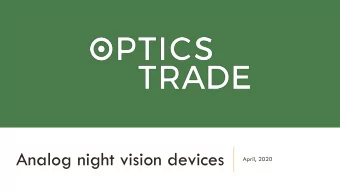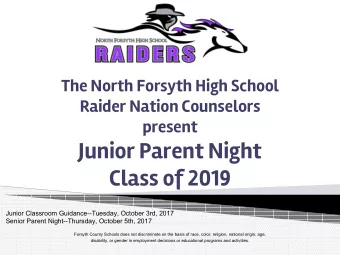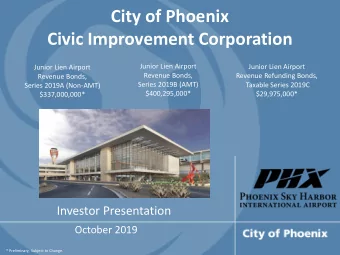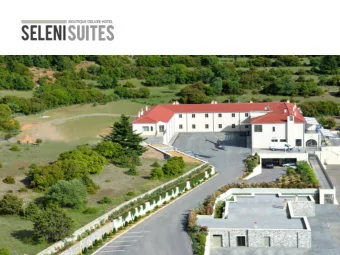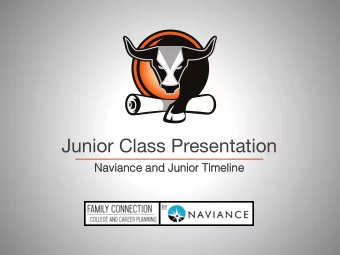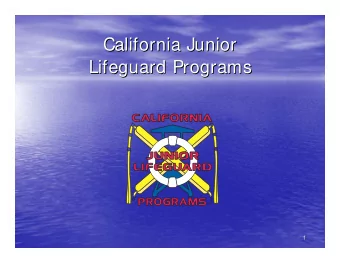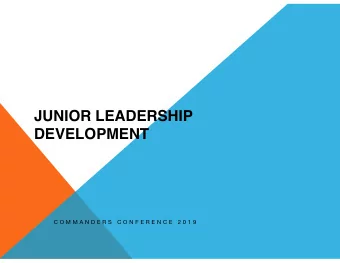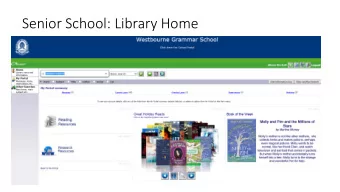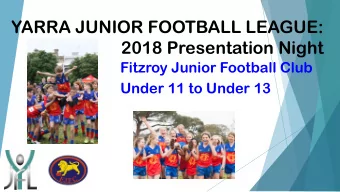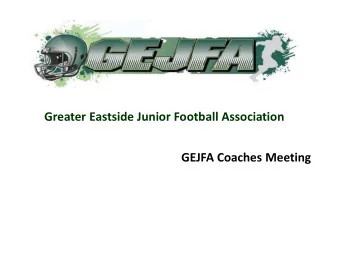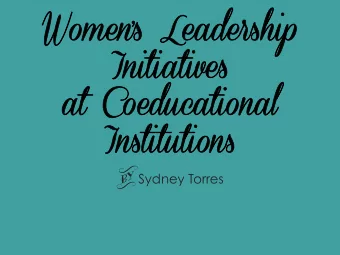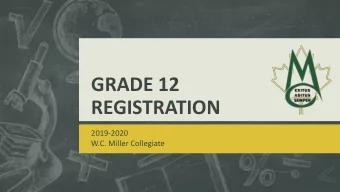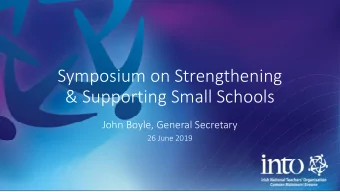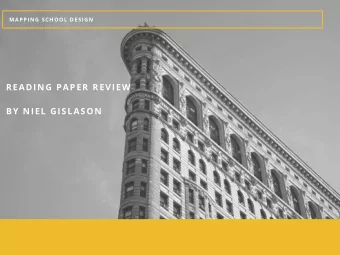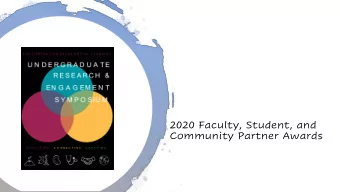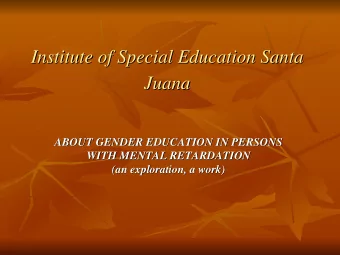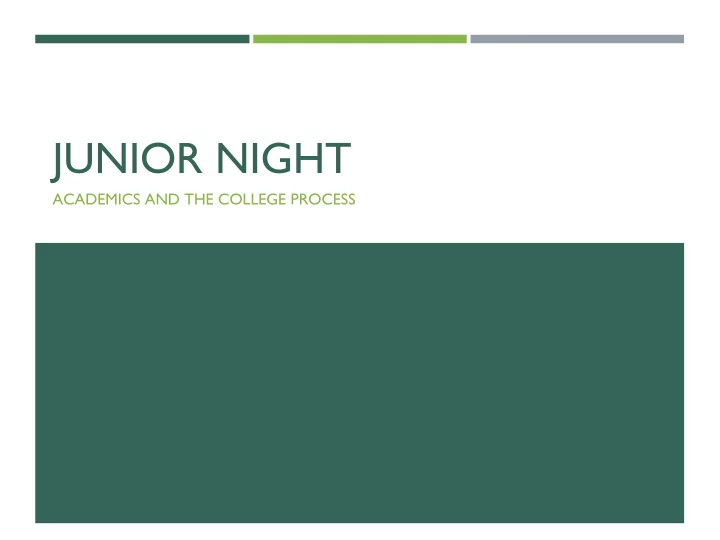
JUNIOR NIGHT ACADEMICS AND THE COLLEGE PROCESS TOPICS OF DISCUSSION - PowerPoint PPT Presentation
JUNIOR NIGHT ACADEMICS AND THE COLLEGE PROCESS TOPICS OF DISCUSSION High School Academics Standardized Testing College Research & Planning Application Process & Components CLASS REGISTRATION 5 REQUIRED courses Possibly
JUNIOR NIGHT ACADEMICS AND THE COLLEGE PROCESS
TOPICS OF DISCUSSION ▪ High School Academics ▪ Standardized Testing ▪ College Research & Planning ▪ Application Process & Components
CLASS REGISTRATION 5 REQUIRED courses Possibly Needed ▪ English 12 ▪ PE ▪ Math ▪ Fine art ▪ Science ▪ Elective ▪ US Government ▪ Consider third/fourth year of foreign language ▪ Religion 12
REGISTRATION (CONT.) ▪ Register for senior year classes in February ▪ Colleges see junior year grades when initial transcript is sent with application ▪ This is the most important year – keep academic momentum rolling ▪ Try to remain in chosen classes for the full year
PSAT RESULTS ▪ http://studentscores.collegeboard.org ▪ Results posted to College Board website December 9 ▪ Sign in with existing College Board username/password ▪ If student cannot remember account information, do not create a new account ▪ Obtain log in information by calling 1-866-315-6068 ▪ If site requires access code, please email your counselor. ▪ Paper scores will be distributed in classes after Christmas break.
STANDARDIZED TESTING ▪ SAT ▪ Mandatory for all juniors Wednesday, March 4, 2020 ▪ May waive out of test day by providing proof of ACT or SAT registration or scores to your counselor by December 13, 2019 ▪ ACT or SAT? ▪ Most 4-year colleges require either ▪ Decide on which best fits your style ▪ If you decide to retake the test, have a goal in mind for a benchmark and take an active approach to test prep
SAT SUBJECT TESTS ▪ Test knowledge in a specific Literature Physics subject area Biology Math Level 1 or (Ecological) Level 2 ▪ RECOMMENDATION: Take Biology United States the test immediately after (Molecular) History completing the course Chemistry World History ▪ Not all students will need to Languages ( reading only ) French, German, Italian, Latin, take these tests Modern Hebrew, Spanish ▪ Required for some highly selective Languages ( with listening ) schools (e.g., Ivy League) Chinese, French, German, Japanese, Korean, Spanish ▪ Recommended for specific majors at some schools
RESEARCHING COLLEGE OPTIONS ▪ Research colleges of interest make a list, narrow it down ▪ Include family members in the process ▪ Consider college visits ▪ Evaluate available finances before finalizing college list ▪ RECOMMENDATION: ▪ Share your list of 5-7 schools of interest with your college counselor ▪ Finalize list by start of senior year
STANFORD IS MY DREAM SCHOOL… ▪ Create a BALANCED list, with other schools you are also excited about! ▪ Academics are very important, but don’t focus solely on academics. Find a way to set yourself apart . School Type Description Highly selective • Less than 10% of applicants admitted Reach • Less than 25% of applicants admitted OR • Below average GPA, md-50% test score range OR • Financial reach for family Realistic • Fit profile of admitted students Safety • KNOW that you will be admitted (Example: UNR publishes their admission criteria online)
QUALITIES TO CONSIDER ▪ Type ▪ Religious affiliation ▪ Size ▪ Co-education/single sex ▪ Student body characteristics ▪ Location ▪ Student life ▪ Academic offerings ▪ Activities ▪ Cost/availability of aid ▪ Admission difficulty ▪ Academic environment
RESEARCHING SCHOOLS ▪ Books (e.g., Fiske Guide to Colleges) ▪ Individual school websites (e.g., UO: admissions.uoregon.edu) ▪ Large online databases (e.g., Big Future: bigfuture.collegeboard.org) ▪ Online financial aid tools ▪ College rep lunch visits ▪ Campus visits (in person or online) ▪ Teachers, family, friends, others (e.g., www.unigo.com)
CAMPUS VISITS ▪ Ideal time to visit is a weekday during the school year (fall break, spring break) ▪ Opportunities to explore: campus tours, information session, overnight stay with a student, sit in on a class, eat in the dining hall ▪ Check on availability through the school admissions website ▪ Pick up a campus newspaper ▪ Virtual campus tours (e.g., YouVisit)
JUNIOR COLLEGE ▪ Do you need a minimum GPA to apply? NO ▪ Do you need a minimum ACT/SAT score? NO ▪ No, but these scores can be used for class placement ▪ Alternative: Some schools offer the ACCUPLACER (not timed) ▪ Can you get financial aid to attend a 2-year school? YES ▪ Complete the FAFSA to apply for federal aid ▪ Millennium still pays towards 2-year school (NV schools only) ▪ NV Promise – free to TMCC (http://nvpromise.tmcc.edu)
JUNIOR COLLEGE: TRANSFER ▪ Can you transfer to a 4-year school? YES ▪ All 2-year schools have an office on campus to help with transfers ▪ UNR: Complete at least 24 units; associates degree accepted as junior ▪ CA: Complete 60 units (~2 years)
REQUIREMENTS: UNR ▪ Minimum GPA 3.0 (core weighted GPA) ▪ 1120 SAT (EBRW/math only) or 22 ACT (composite) waive the core GPA requirement ▪ Must take ACT or SAT for class placement ▪ Entry-level English: 21 ACT or 480 SAT (EBRW) ▪ Entry-level math: 22 ACT or 530 SAT ▪ BMCHS academic pathway fulfills the required high school coursework
MILLENNIUM SCHOLARSHIP ▪ Students DO NOT need to apply for this scholarship ▪ Must have a 3.25 GPA (any) or 21 ACT ▪ ALL courses, not just core ▪ Be a Nevada resident at least 2 years of high school ▪ IMPORTANT: There may be changes to Millennium eligibility after each legislative session
UNIV. OF CALIFORNIA ▪ Minimum GPA for CA residents: 3.0 ▪ Minimum GPA for non-CA residents: 3.4 ▪ No grades lower than a C ▪ Self-report grades (BMCHS does NOT send a transcript) ▪ Scores from a single sitting (SAT/ACT) are used ▪ No SAT Subject Test requirements for application process, but recommended for some majors at some campuses ▪ No letters of recommendation (exception: Berkeley may request)
SERVICE ACADEMIES ▪ Application process, beginning with a preliminary application, STARTS SOON (Dec/Jan) ▪ RECOMMENDATION: Apply for the Summer Seminar program (West Point, Navy, Air Force, Coast Guard) ▪ More steps involved in this application process ▪ Physical Assessment ▪ Meeting/interview with academy liaison ▪ Nomination by Congressional Representative or US Senator
NCAA ELIGIBILITY CENTER ▪ Register with the NCAA Eligibility Center ▪ http://www.eligibilitycenter.org ▪ D1/DII: must have account before official visits ▪ DIII/undecided: not required, can always change type of account ▪ Required components ▪ Completed online account, pay fee ($90) ▪ HS Transcript: is automatically sent at the end of junior year for all students. ▪ ACT/SAT scores: Send through testing agency (college code: 9999)
APPLICATION PROCESS ▪ We recommend about 5 applications, if you are looking out-of-state ▪ Only apply to colleges you would/can attend if accepted ▪ Start thinking about letters of recommendation in spring; request in fall ▪ Teachers/Counselor
FINAL THOUGHTS ▪ Start early ▪ Lots of variation in this process; stay organized! ▪ Clean-up your social media profile; set up permissions ▪ Get a professional email address ▪ Find your fit; worry about yourself and what works for you ▪ Researching colleges and deciding where to apply/attend is the student’s process
CONTACTS Bethany Salter (A-G) Cathy McClintock (R-Z) Bethany.Salter@bishopmanogue.org Cathy.McClintock@bishopmanogue.org Jessie Koltz (H-Q) Lauren McBride (College) Jessie.Koltz@bishopmanogue.org Lauren.McBride@bishopmanogue.org
Recommend
More recommend
Explore More Topics
Stay informed with curated content and fresh updates.


